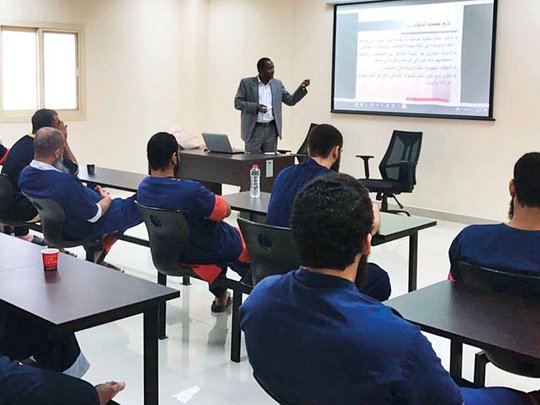
Group iftar with families
The family iftar includes 20-25 inmates and the number of families invited depends on the desire of the inmates. The families arrive before the iftar time and leave before the Taraweeh prayer.
The initiative supports the General Directorate of Punitive and Rehabilitation Establishments’ charitable and humanitarian initiatives.
Cooking classes
Shaikh Sultan’s book
The competition also covers various scientific, social and religious aspects.
The library at the centre houses more than 2,000 books, of which 775 books are from Shaikh Sultan. Prisoners are encouraged to read books as part of their rehabilitation programme.
Sport competitions
“This year, we have scheduled a number of competitions — soccer, basketball, tennis, cricket and even chess,” said Colonel Ahmad Suhail.
Quran memorisation
“[Memorising] five parts of the holy book will reduce the sentence by one year; 10 parts by five years; 15 parts by 10 years; 20 parts by 15 years; and 30 parts — the whole Quran — will reduce the sentence by 20 years.” “Of course, that is dealt with on a case-by-case basis and depends on the crime,” said Colonel Suhail. “We want to help and encourage them to decrease their sentence, however, we make sure that by doing so, it is not violating anybody’s else’s rights.”
‘Journey of Change’
Ramadan majlis
The Majlis hosts an elderly expert who speaks about the UAE society, its values and traditions and narrates stories which offer lessons for the inmates to avoid crime in all its forms. They are also educated on how to become valuable members of society post-release. The initiative is first of its kind in the country and in the Middle East.
Ramadan Meer and Kiswa Al Eid
Ramadan Meer is one of the leading charity projects of the centre for the benefit of the families of inmates. An employee of the centre visits the inmates’ families and gives them either foodstuffs [packed in a box] or gives them coupons they can use at the Sharjah Cooperative Society.
About three weeks of Ramadan are allocated to distribute Meer while the fourth week is allocated to distribute Kiswa Al Eid [Eid clothes]. This year, Meer will be given to 45 families and Eid clothes to 40 children.








